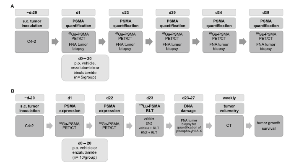Preclinical evaluation of PSMA expression in response to androgen receptor blockade for theranostics in prostate cancer
- David Geffen School of Medicine at UCLA, Los Angeles, CA (United States); Univ. of California, Los Angeles, CA (United States)
- David Geffen School of Medicine at UCLA, Los Angeles, CA (United States)
- Univ. Essen, Essen (Germany)
- Lund Univ., Lund (Sweden)
- David Geffen School of Medicine at UCLA, Los Angeles, CA (United States); Univ. Essen, Essen (Germany)
- Technical Univ. of Munich, Munich (Germany)
Prostate-specific membrane antigen (PSMA)-directed radioligand therapy (RLT) is a promising yet not curative approach in castration-resistant (CR) prostate cancer (PC). Rational combination therapies may improve treatment efficacy. Here, we explored the effect of androgen receptor blockade (ARB) on PSMA expression visualized by PET and its potential additive effect when combined with 177Lu-PSMA RLT in a mouse model of prostate cancer. Mice bearing human CRPC (C4-2 cells) xenografts were treated with 10 mg/kg enzalutamide (ENZ), with 50 mg/kg bicalutamide (BIC), or vehicle (control) for 21 days. PSMA expression was evaluated by 68Ga-PSMA11 PET/CT and quantified by flow cytometry of tumor fine needle aspirations before treatment and on days 23, 29, 34, and 39 post-therapy induction. For the RLT combination approach, mice bearing C4-2 tumors were treated with 10 mg/kg ENZ or vehicle for 21 days before receiving either 15 MBq (84 GBq/μmol) 177Lu-PSMA617 or vehicle. DNA damage was assessed as phospho-γH2A.X foci in tumor biopsies. Reduction of tumor volume on CT and survival were used as study endpoints. Tumor growth was delayed by ARB while 68Ga-PSMA11 uptake increased up to 2.3-fold over time when compared to controls. ABR-induced upregulation of PSMA expression was confirmed by flow cytometry. Phospho-γH2A.X levels increased 1.8- and 3.4-fold at 48 h in response to single treatment ENZ or RLT and ENZ+RLT, respectively. Despite significantly greater DNA damage and persistent increase of PSMA expression at the time of RLT, no additional tumor growth retardation was observed in the ENZ+RLT group (vs. RLT only, p = 0.372 at day 81). Median survival did not improve significantly when ENZ was combined with RLT. ARB-mediated increases in PSMA expression in PC xenografts were evident by 68Ga-PSMA11 PET imaging and flow cytometry. 177Lu-PSMA617 effectively decreased C4-2 tumor size. Furthermore, while pre-treatment with ARB increased DNA damage significantly, it did not result in synergistic effects when combined with RLT.
- Research Organization:
- Univ. of California, Los Angeles, CA (United States)
- Sponsoring Organization:
- USDOE Office of Science (SC), Biological and Environmental Research (BER). Biological Systems Science Division
- Grant/Contract Number:
- SC0012353
- OSTI ID:
- 1483931
- Journal Information:
- EJNMMI Research, Vol. 8, Issue 1; ISSN 2191-219X
- Publisher:
- Springer OpenCopyright Statement
- Country of Publication:
- United States
- Language:
- English
Web of Science
Similar Records
177 Lu-Labeled Phosphoramidate-Based PSMA Inhibitors: The Effect of an Albumin Binder on Biodistribution and Therapeutic Efficacy in Prostate Tumor-Bearing Mice
TU-F-12A-01: Quantitative Non-Linear Compartment Modeling of 89Zr- and 124I- Labeled J591 Monoclonal Antibody Kinetics Using Serial Non-Invasive Positron Emission Tomography Imaging in a Pre-Clinical Human Prostate Cancer Mouse Model




